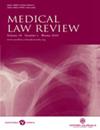Is the Unequal Treatment of Maternal and Paternal Liability Under the Congenital Disabilities (Civil Liability) Act 1976 Justified?
IF 1.8
4区 医学
Q1 LAW
引用次数: 0
Abstract
Abstract Under the Congenital Disabilities (Civil Liability) Act 1976 (CDCLA) a child born disabled as a result of an occurrence prior to its birth can bring a claim against the individual responsible for that occurrence. Significantly, mothers are exempt from liability (except in relation to negligent driving) but fathers are not. Since the CDCLA came into force in 1976, there have been significant shifts in the landscape in which it operates: a more gender-neutral model of parenting; transmission of an infection to a sexual partner can be a criminal offence; and growing evidence regarding the impact of prenatal events. In addition, there is a trend for presenting prenatal harm as a problem of individual behaviour. This article presents a timely consideration of the potential for parental liability under the CDCLA and asks whether restricting the exemption of parental liability to mothers but not fathers can be justified. It is argued that the reasons for unequal parental liability in relation to gestational harm are not sufficient to justify restricting the broad exemption to mothers but not fathers and a change in the law is required to bring the CDCLA up to date with advances in the criminal law, society, and medical science.1976年《先天性残疾(民事责任)法》对父母责任的不平等待遇是否合理?
摘要根据1976年《先天性残疾(民事责任)法》(CDCLA),由于出生前发生的事故而导致先天残疾的儿童可以向该事故的责任人提出索赔。值得注意的是,母亲可以免除责任(除了与疏忽驾驶有关的责任),而父亲则不能。自1976年《儿童残疾保护法》生效以来,其运作方式发生了重大变化:更加性别中立的育儿模式;将感染传播给性伴侣可构成刑事犯罪;越来越多的证据表明产前事件的影响。此外,有一种趋势是将产前伤害视为个人行为的问题。这篇文章提出了在CDCLA下父母责任的可能性的及时考虑,并询问限制父母责任的豁免对母亲而不是父亲是否可以合理。缔约国认为,与妊娠伤害有关的父母责任不平等的理由不足以证明将广泛豁免限于母亲而不限于父亲是合理的,需要修改法律,使《儿童与儿童权利法》跟上刑法、社会和医学的进步。
本文章由计算机程序翻译,如有差异,请以英文原文为准。
求助全文
约1分钟内获得全文
求助全文
来源期刊

Medical Law Review
MEDICAL ETHICS-
CiteScore
3.10
自引率
11.80%
发文量
50
审稿时长
>12 weeks
期刊介绍:
The Medical Law Review is established as an authoritative source of reference for academics, lawyers, legal and medical practitioners, law students, and anyone interested in healthcare and the law.
The journal presents articles of international interest which provide thorough analyses and comment on the wide range of topical issues that are fundamental to this expanding area of law. In addition, commentary sections provide in depth explorations of topical aspects of the field.
 求助内容:
求助内容: 应助结果提醒方式:
应助结果提醒方式:


